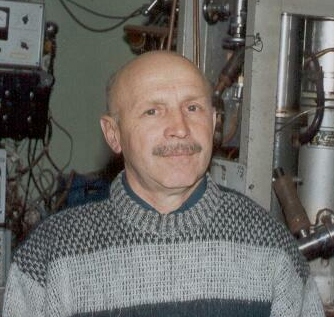|
M.I. Bagatskii, born 16th September, 1939, in Kharkov, graduated from
Kharkov State University in 1962. Since 1962 he has working at the
Institute for Low Temperature Physics and Engineering of NAS of Ukraine in
the Department of Thermal Properties of Molecular Crystals.
Since 1962 M.I. Bagatskii has been engaged in
calorimetric investigations at low temperatures. He is an author and
co-author of over 70 scientific publication and investigations.
M.I. Bagatskii and his collaborators have developed and
constructed a unique adiabatic colorimeter permitting investigations of
thermal effect in crystals and the heat capacity of quantum and classical
molecular crystals (cryocrystals) in temperature interval of 0.4 300 Ê.
Basic trends of scientific activity: phase
transitions, lattice dynamics of quantum molecular crystals (H2,
HD, D2, CH4) and their solution, classical
cryocrystals (Ne, Ar, Kr, Xe, N2, CO2, CO, ND3,
NH3, CH4, CD4, CCl4, SF4,
and so on) and their solytions, dynamic of disordered systems, impacts of
various factor on heat transfer in a system with superfluid helium.
Properties under investigation: heat capacity, heats of phase
transition, conversion, quantum diffusion (configuration relaxation).
| Principal results obtained by the researchers of
the group: |
| - |
detection of a great decrease in helium transfer by the film on
the solid para-hydrogen surface |
| - |
detection of quantum diffusion in solid deuterium with a
record-narrow tunelling band
≈ 10-9 Ê, |
| - |
detection of a glass-like behavior of weak solution of
cryocrystals - detection of nuclear |
| - |
spin conversion of deuteromethane in solid CD4–Kr
solution at helium temperatures |
It has been shown experimentally that quantum diffusion in solid
hydrogen and deuterium is determined by the tunnel transfer of the angular
momentum of the molecule rather than by the mass transfer. The isotopic
effect in the heat capacity of solid concentrated orientationally
disordered solutions of ÑD4 and ÑÍ4 in Kr has been
revealed and interpreted. It is shown experimentally that the hybryd
machanism of ÑD4 and ÑÍ4 conversion is dominant
below 2 K.
Publication after 2000:
- I.Ya. Minchina, V. G. Manzhelii, M. I. Bagatskii, O. V. Sklyar, D.
A. Mashchenko, and M. A. Pokhodenko, Heat capacity of methane-krypton
solid solutions. Conversion effect, Fiz. Nizk. Temp. 27, 773,
(2001) [Low Temp. Phys. 27, 568 (2001)].
- M.I. Bagatskii, V.G. Manzhelii, I.Ya. Minchina, D.A. Mashchenko, I.A. Gospodarev,
Rotational excitations in concentrated solid Kr–CH4
solutions. Calorimetric studies, J. Low Temp. Phys. 130, 459
(2003).
- 3. M.I. Bagatskii, V.G. Manzhelii, D.A. Mashchenko, V.V. Dudkin,
Detection of nuclear-spin conversion of CD4 molecules in
solid deuteromethane-krypton solution, Fiz. Nizk. Temp 29, 216
(2003) [Low Temp. Phys. 29, 159 (2003)].
- M.I. Bagatskii, V.G. Manzhelii, D.A. Mashchenko, V.V. Dudkin, Heat
capacity of solid deuteromethane-krypton solutions, Nuclear spin
conversion in CD4 molecules. Fiz. Nizk. Temp 29, 1362
(2003) [Low Temp. Phys. 29, 1028 (2003)].
- M.I. Bagatskii, V.V. Dudkin., D.A. Mashchenko, V.G. Manzhelii, E.V.
Manzhelii, Isotopic effect in heat capacity of solid concentrated
orientationally-disordered solutions of methane and deuteromethane in
krypton, Fiz. Nizk. Temp 31, (2005) [Low Temp. Phys. 31,
(2005) (in press)].
- M.I. Bagatskii, I.Ya. Minchina, V.M. Bagatskii, Heat capacity of p-H2
p-D2 Ne solid solution: Effect of (p-D2)Ne
clusters, Fiz. Nizk. Temp 31, 620 (2005) [Low Temp. Phys. 31,
470 (2005)].
- M.I. Bagatskii, V.V. Dudkin, V.G. Manzhelii, D.A. Mashchenko, S.B. Feodosiev,
Low temperature anomaly of heat capacity of CD4 rotors in
solid CD4 Kr solution, J. Low Temp. Phys.
139, 551
(2005).
June, 2005. |
